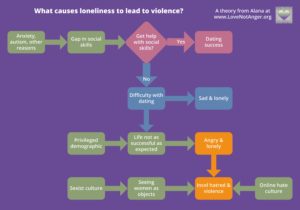Defining the concept
My original meaning of “involuntary celibacy” was “wanting to have sex and/or a relationship, but unable to find a willing partner”. This included people of all genders and orientations who had various barriers to finding a partner for dating and/or sex.
When I started the original support website in 1997, I chose the term “involuntary celibacy” to be more neutral than pejoratives like “lonely virgin”. I did some academic literature searching and found no formal terminology for the issue (though I missed Brian Gilmartin’s book about “Love-Shyness”).
I adapted the term from the religious concept of “celibacy”, meaning a voluntary abstinence from both sex and marriage, such as a priest or nun who chooses that path. I added “involuntary” to indicate the people who just found themselves single, well into adulthood, without intending to stay celibate. The issue for lonely people is not just lack of sex, but also a lack of romantic relationships and other human connections.
To me, “involuntary celibate” never meant “unable to have sex” or “too unattractive to find a partner”. In my observations and research, most people without dating experience have some emotional barrier that could be resolved, such as fear of approaching someone for a date, or not understanding how to communicate their feelings, or being too depressed to take care of themselves.
Abbreviating the term
Originally I used the abbreviation “invcel”. (My first article on the topic needed a DOS filename of 8 characters or less!) Someone else on the mailing list (the original forum) suggested that “incel” would be easier to pronounce, so we had switched by 1999.
Since the incel forums became exclusively male, and trended towards misogyny, the world has come to use the term “incel” to refer to men who are angry at women because they can’t find someone to date or have sex with. Reclaiming the term for the original neutral meaning would be a hopeless cause.
There are many lonely people in this world, of all genders and orientations, who have difficulty finding partners, or who have little dating experience. They might still use the term “incel” or they might find other words for their situation.
Some of my collaborators have advised that we shouldn’t try to coin a simple new term for these dating difficulties. A clever new coinage might be adopted by angry incel men who want to escape the extra stigma created by the murders. There is no sense getting on the “euphemism treadmill” described at the end of this interesting article about my coining “incel”.
The incel community has developed long glossaries of terminology, often using the flexible suffix “cel”. Although this is linguistically impressive, I think research efforts should focus instead on reducing loneliness and preventing violence.





Pingback: My history with involuntary celibacy – Love Not Anger